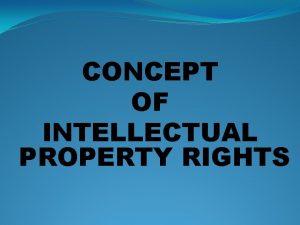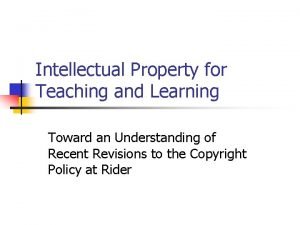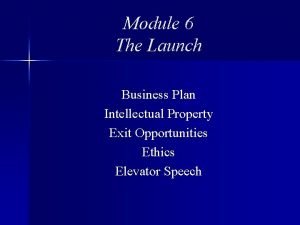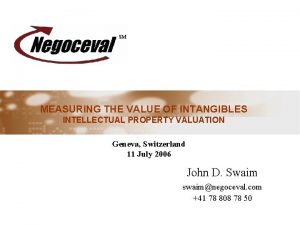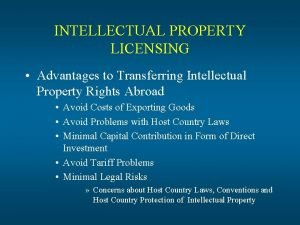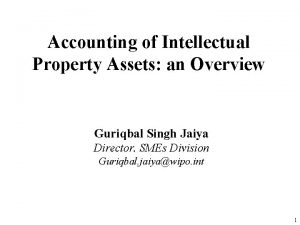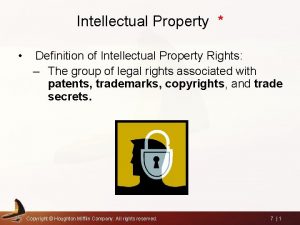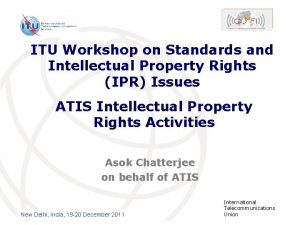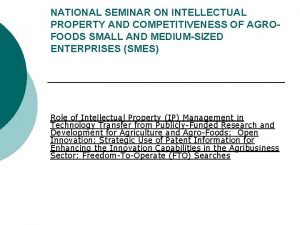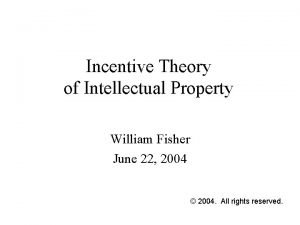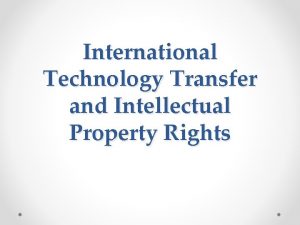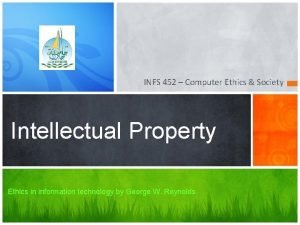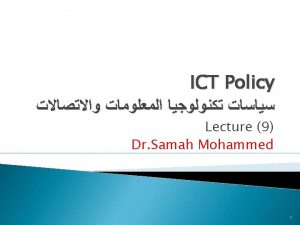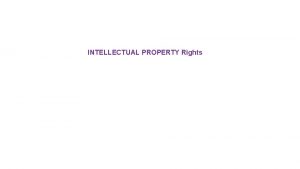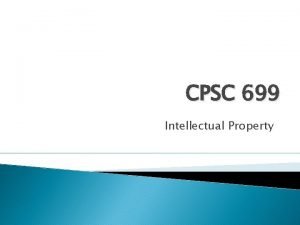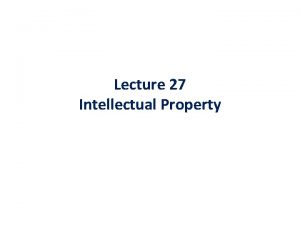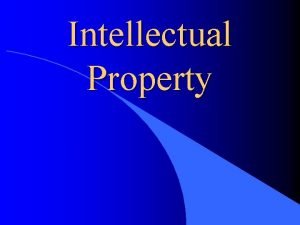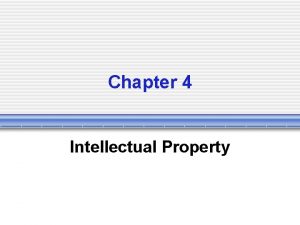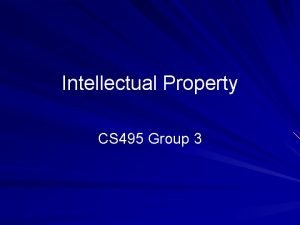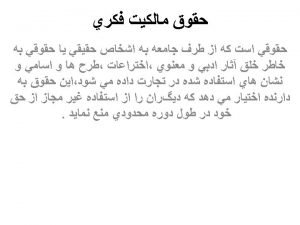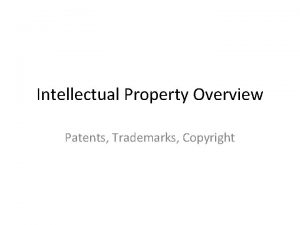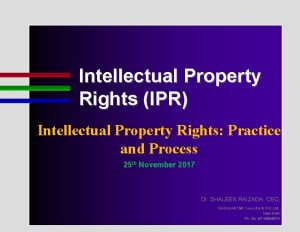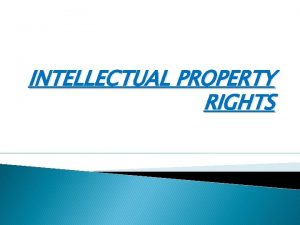The Origins of Intellectual Property the condition of





















- Slides: 21

The Origins of Intellectual Property “the condition of the patent , compelling a discovery, makes that common which was private before” Edmund Burke, 1775

Harpocrates God of Silence

Secrecy and Openness? With this one, I disclose secrets” Athanasius Kircher, 1652 -55

The Medieval Engineers Craft knowledge and the origins of “intellectual property” Mariano Taccola (1382 - ca. 1453) Siena De ingeneis (On Ingenious Devices) ca. 1419 -33 “Ingenuity resides in the mind. . . ”

Taccola’s universal machine “It is said that this device is used in many places and could thus be called a universal machine…”

The Limits of Sharing Knowledge “Nothing … can be brought to perfection without me. My speech has been veiled. What has been acquired during a rather long time with labor shall not be known at once. ” “Do not share your inventions with many …”

Taccola’s paddle wheel Filippo Brunelleschi’s 3 yr license for Il Badalone, 1421

The Venetian Patent System “Patents” and “Copyright” “Privileges, ” “Monopolies, ” “Supplications” and “Letters Patent” John of Speyer’s 1469 privilege to print Sept 1486: inventing copyright? Albrecht Dürer’s monogram, 1490 s


VENETIAN PATENT ACT (19 MARCH 1474) WE HAVE among us men of great genius, apt to invent and discover ingenious devices; and in view of the grandeur and virtue of our City, more such men come to us every day from divers parts. Now, if provision were made for the works and devices discovered by such persons, so that others who may see them could not build them and take the inventor's honor away, more men would then apply their genius, would discover, and would build devices of great utility and benefit to our commonwealth. Therefore: •

Venetian Patent Law (cont. ) BE IT ENACTED that, by the authority of this Council, every person who shall build any new and ingenious device in this City, not previously made in our Commonwealth, shall give notice of it to the office of our General Welfare Board when it has been reduced to perfection so that it can be used and operated. It being forbidden to every other person in any of our territories and towns to make any further device conforming with and similar to said one, without the consent and license of the author, for the term of 10 years. And if anybody builds it in violation hereof, the aforesaid author and inventor shall be entitled to have him summoned before any magistrate of this City, by which magistrate the said infringer shall be constrained to pay him hundred ducats; and the device shall be destroyed at once. It being, however, with the power and discretion of the Government, in its activities, to take and use any such device and instrument, with this condition however that no one but the author shall operate. Source: Giulio Mandich, “Venetian Patents (1450 -1550, ” Journal of the Patent Office Society 30 (1948): 176 -177.

Key Characteristics Foreign vs. local expertise Novelty, ingenuity, labor Priority claims Proof of concept (revealing the secrecy? ) Public benefit and utility Duration of license

Early Modern Licensing Systems Exporting the Venetian System Jacopo Acontio’ petition to Elizabeth I, 1559 “inventors should be rewarded and protected against others making profits out of their discoveries. ” Statute of Monopolies, 1624

Early Modern Science and Intellectual Property Case Studies

Galileo v. Baldessar Capra, 1607

The Geometric and Military Compass

Galileo’s Defense against Capra

Johannes Kepler vs. Tycho Brahe’s heirs

Kepler’s Confidentiality Agreement with Tycho (5 April 1600) “to keep everything that the well-informed Herr Tycho has communicated to me, or shall hereafter communicated to me, in whatever manner, top secret. ” “philosophical theft” New agreement with heirs (4 July 1604) Rudolphine Tables (1627)

Kepler, New Astronomy (1609)

The Uses of Renaissance Data
 Concept of intellectual property
Concept of intellectual property At&t intellectual property
At&t intellectual property Intellectual property management definition
Intellectual property management definition Discuss intellectual property frankly
Discuss intellectual property frankly Characteristics of intellectual property
Characteristics of intellectual property Right to intellectual property of teachers
Right to intellectual property of teachers Intellectual property business plan example
Intellectual property business plan example Trade-related aspects of intellectual property rights
Trade-related aspects of intellectual property rights Valuing intangible assets
Valuing intangible assets Licensing advantages
Licensing advantages Intangible inputs
Intangible inputs Industrial property definition
Industrial property definition Secondary infringement
Secondary infringement Evalueserve competitors
Evalueserve competitors Intellectual property rights
Intellectual property rights Intellectual property business plan example
Intellectual property business plan example Intellectual property
Intellectual property Incentive theory
Incentive theory Importance of intellectual property
Importance of intellectual property Discuss intellectual property frankly
Discuss intellectual property frankly Intellectual property rights
Intellectual property rights Property
Property
